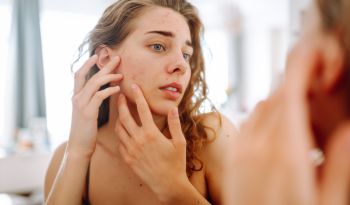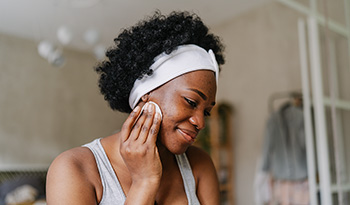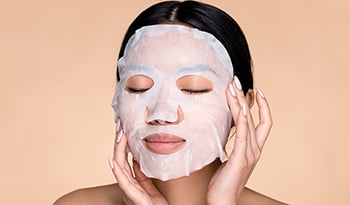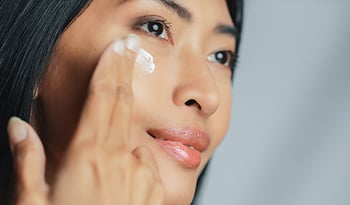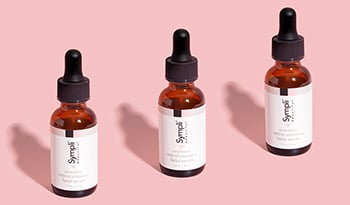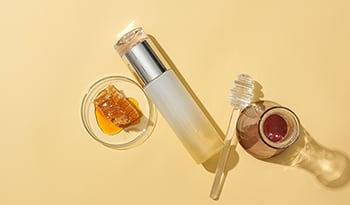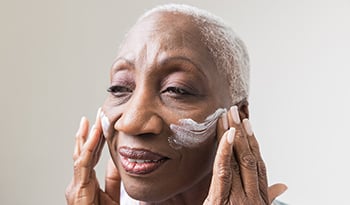Jak se zbavit mastné pleti přirozeně

Mastná pleť je problémem mnoha dospívajících i dospělých. Vzhledem k tomu, že mastná pleť má mnoho původů, může být zjištění její příčiny výzvou, díky čemuž je tento stav pokožky obzvláště dráždivý. A zatímco jednoduché změny životního stylu a některé produkty péče o pleť mohou zlepšit nebo dokonce vyřešit některé příčiny mastné pleti, jiné příčiny mohou být obtížnější opravit. Naštěstí existuje mnoho způsobů, jak zlepšit mastnou pleť, bez ohledu na původ.
Co způsobuje mastnou pleť?
Mastná pleť může být způsobena mnoha faktory — některé jsou pod naší kontrolou a jiné ne. Zatímco genetická predispozice k mastné pokožce může být obtížnější bojovat, jsou k dispozici léky. Hormonální změny a faktory životního stylu mohou ovlivnit produkci oleje. Například strava bohatá na přidaný cukr, nekvalitní tuky a vysoce zpracované potraviny může snížit celistvost pokožky, což vede k větší produkci oleje.
A konečně, produkty, které používáte na pokožku, a vaše každodenní péče o pleť mohou také ovlivnit produkci oleje. Některé produkty odstraňují přírodní oleje z pokožky a signalizují vašemu tělu, aby produkovalo více oleje.
Zvládání mastné pleti je hlavní otázkou pro dermatology, kteří vám mohou pomoci identifikovat příčiny vaší mastné pleti a pomoci vyvinout rutinu péče o pleť, která vyhovuje potřebám vaší pleti.
Přírodní prostředky pro mastnou pleť
Zatímco váš dermatolog může navrhnout nebo předepsat volně prodejné nebo předpis léčby, je k dispozici mnoho přírodních prostředků pro mastnou pleť, které můžete prozkoumat. Zatímco některé, jako jsou hliněné masky a blotovací papíry, jsou navrženy tak, aby zlepšily mastnou pleť jako své primární funkce, mnoho domácích ingrediencí může zlepšit vaši mastnou pleť. A zatímco některé mohou dočasně snížit výskyt oleje na pokožce, jiní pracují aktivněji na snížení probíhající produkce oleje.
Blotovací papíry
Blotovací papíry mohou rychle a snadno snížit mastnotu na pokožce — obecně se však jedná o dočasnou opravu. Pokud jste venku a potřebujete jednoduchý způsob, jak zvládnout olej na kůži, blotovací papíry jsou jedním z nejpohodlnějších řešení.
Při jemném poklepání po kůži absorbují savé papíry olej a odstraňují ho z povrchu pokožky. Tím se snižuje lesklý vzhled, který se mnohým nelíbí, a vytváří matnější vzhled. Přečtěte si další řešení pro mastnou pleť, která mohou celkově snížit produkci oleje.
Zlato
Med je domácí přísada, která může zlepšit mastnou pleť. I když jej již můžete použít k oslazení čaje a při pečení a vaření, med má jedinečné vlastnosti, které prospívají vaší pokožce, když je aplikován lokálně.
Med má přirozené antibakteriální a antiseptické vlastnosti, které mohou redukovat mikroby na kůži a snížit produkci oleje. Navíc med může pomoci snížit pravděpodobnost skvrn a akné díky svým antibakteriálním vlastnostem.
Zatímco všechny formy medu lze použít k výrobě obličejové masky, manuka med je jedinečná forma medu s ještě více antimikrobiálními vlastnostmi než tradiční sladidlo. Můžete si vyrobit medovou masku smícháním medu a ovsa v mixéru a nanesením na obličej. Jemně protřete směs přes obličej a poté zcela omyjte.
Kosmetické hliněné masky
Stejně jako blotovací papíry absorbují hliněné masky přebytečný olej z povrchu pokožky. I když to nemusí být rychlé řešení, když jste na cestách, zahrnutí maskování jako součást vaší pravidelné péče o pleť může snížit produkci oleje ve vaší pokožce a zároveň snížit „olejový lesk“.
Mnoho kosmetických značek vyrábí hliněné masky připravené k použití , které můžete aplikovat přímo na pokožku a nechat působit po určitou dobu, než je jednoduše omyjete. Některé hliněné výrobky lze kombinovat s jinými přísadami, jako je jablečný ocet, a vytvořit obličejovou masku. Bez ohledu na to, který hliněný produkt používáte, ujistěte se, že dodržujete pokyny na obalu pro bezpečné používání.
Aloe Vera
Stejně jako med, aloe vera je další produkt pro domácnost, který může prospět pokožce mnoha způsoby. I když už možná máte doma gel zakoupený v obchodě, abyste zmírnili nepříjemné pocity při spálení sluncem, můžete tento produkt také aplikovat na obličej, abyste odradili mastnou pleť. Čerstvé aloe vera lze také aplikovat na pokožku jako zvlhčovač, který snižuje produkci oleje.
Při použití jakékoli formy aloe je důležité nejprve otestovat malou skvrnu kůže, než ji použijete na větší plochu. Někteří lidé jsou alergičtí na aloe - náplastový test vám může pomoci vyhnout se rozšířenějšímu nepohodlí v případě, že máte citlivost.
Ovesné vločky
I když jste možná zvyklí jíst své ovesné vločky namísto nanášení na pokožku, domácí maska z ovesných vloček je dalším řešením mastné pleti. Ovesné vločky mají přirozené protizánětlivé vlastnosti, takže při aplikaci na pokožku mohou také snížit zarudnutí a výskyt akné a skvrn. Navíc lokálně aplikované ovesné vločky mohou absorbovat olej a snížit množství, které spočívá na povrchu pokožky.
Můžete kombinovat med a ovesné vločky a vytvořit jednoduchou masku nebo smíchat 2 lžíce ovesných vloček s 1 lžičkou jedlé sody a jen tolik vody, abyste vytvořili pastu. Aplikujte na pokožku asi 10 minut a důkladně opláchněte masku redukující olej.
Jojobový olej
Nanášení oleje na obličej se může zdát neintuitivní, pokud máte mastnou pleť. Nicméně, jojobový olej je složkou, která může prospět mastné pleti nebo pleti náchylné k akné.
Při lokální aplikaci může jojobový olej vyvážit vaši přirozenou produkci oleje a snížit množství oleje, který vaše pokožka produkuje. Jojobový olej je také považován za nekomedogenní, což znamená, že nezanáší vaše póry - další výhoda, pokud trpíte akné. Aplikace jojobového oleje přímo na obličej může také zvlhčit pokožku a zároveň zmírnit produkci oleje. Pro zvýšení síly boje proti oleji zvažte přidání jojobového oleje do své oblíbené hliněné masky.
Vaječné bílky a citronová šťáva
Kombinace vaječných bílků a citronové šťávy je další domácí maska používaná ke snížení produkce oleje. Při aplikaci na obličej mohou vaječné bílky uzavřít póry a snížit sekreci mazu (oleje). To může vést k méně mastnému obličeji a může snížit pravděpodobnost akné a skvrn.
Citronová šťáva v této masce slouží jako lehké bělící činidlo, které pomáhá vyrovnat vaši pleť. Nezředěná citronová šťáva by neměla být používána přímo na kůži, protože by mohla způsobit reakci a pocit pálení. Místo toho zřeďte citronovou šťávu, než ji přidáte do vaječných bílků při výrobě masky. Poté, co byla maska zapnutá asi 10 minut, důkladně omyjte teplou vodou.
Mandle
Jistě, mandle jsou lahodnou a výživnou svačinou — ale mohou také zlepšit mastnou pleť. Mandle jsou zdrojem zdravých nenasycených tuků. Když jsou rozdrceny v kuchyňském robotu a aplikovány na pokožku, mohou také vyvážit produkci kožního oleje. vitamín E v mandlích také poskytuje své vlastní výhody, jako je rozjasnění pokožky a zlepšení poškození kůže způsobeného expozicí UV záření.
Použijte stejné díly medu a drcených mandlí a poté naneste tento exfoliační peeling na obličej. Jemně vmasírujte do pokožky a poté opláchněte.
Umyjte si obličej
Jedním z nejzřejmějších způsobů, jak zlepšit mastnou pleť, je mytí obličeje, aby se odstranil přebytečný olej. I když to zní jednoduše, je třeba mít na paměti několik věcí, abyste se ujistili, že pomáháte - a nepoškodíte - stav vaší pokožky.
Nejprve určete typ pleti a určete správný typ čisticího prostředku pro vaši pokožku. Ti, kteří mají mastnou pleť, mohou nejvíce těžit z bezolejového čisticího prostředku, jako je pěnivý nebo gelový čisticí prostředek. Mnoho dalších složek může také prospět mastné pokožce. Podívejte se na tento článek , kde se dermatologem dozvíte, jaké ingredience je třeba při výběru čisticího prostředku hledat.
Nakonec se poraďte se svým dermatologem, jak často byste si měli umýt obličej. Příliš časté mytí čisticím prostředkem - nebo ne dostatečně často - může ovlivnit tvorbu kožního mazu. Ve většině případů byste si neměli umýt obličej více než dvakrát denně a někteří mohou mít prospěch z omezení čištění na jednou denně.
Denní tipy pro mastnou pleť
Zvládání mastné pleti může vyžadovat několik pokusů a omylů. To, co funguje pro vašeho přítele, nemusí fungovat pro vás - a naopak. S těmito tipy, triky a radami však budete na dobré cestě k krásné a zdravé pokožce.
I když můžete být nadšeni, že můžete vyzkoušet tyto nové nápady na péči o pleť pro mastnou pleť, neimplementujte je všechny najednou. Mezi vyzkoušením nových produktů nebo domácích masek počkejte několik dní, abyste zabránili ohromení citlivé pokožky na obličeji. Přehnané používání příliš mnoha nových ošetření by mohlo vést k ještě větším problémům s pokožkou.
Spolu s vyzkoušením nových ošetření pro mastnou pleť se ujistěte, že zůstanete dobře hydratovaní. Dehydratace může zhoršit mastnou pleť, proto pijte hodně vody po celý den a zaměřte se na minimálně 80 uncí celkové tekutiny denně. Držení opakovaně použitelné lahve po ruce je skvělý způsob, jak udržet přehled o svých potřebách tekutin.
Kromě toho hledejte bezolejové výrobky pro péči o pleť a make-up, které zlepšují mastnou pleť. A nezapomeňte zvlhčit pokožku. I když se může zdát, že zvlhčovač by mohl učinit pokožku ještě mastnější, hydratace je nezbytná pro kontrolu vlhkosti pokožky, zlepšení mastnoty a dosažení zdravé pokožky.
Odkazy:
- Michalak M. Rostlinné extrakty jako péče o pleť a terapeutická činidla. Int J Mol Sci.2023; 24 (20): 15444. Publikováno 2023 22. října.
- Capone K, Kirchner F, Klein SL, Tierney NK. Účinky koloidního ovesného topického krému na atopickou dermatitidu na kožní mikrobiom a vlastnosti kožní bariéry. J Drogy Dermatol. 2020; 19 (5): 524-531.
- Lin TK, Zhong L, Santiago JL. Protizánětlivé a kožní bariérové účinky lokální aplikace některých rostlinných olejů. Int J Mol Sci.2017; 19 (1) :70. Publikováno 2017 27. prosince.
- Kurek-Gorečka A, Goreček M, Rzepecka-Stojko A, Balwierz R, Stojko J. Včelí produkty v dermatologii a péči o pleť. Molekuly. 2020; 25 (3): 556.
VYLOUČENÍ ODPOVĚDNOSTI: Tento blog není určen ke stanovení diagnózy...

















































































 Obsah
Obsah



